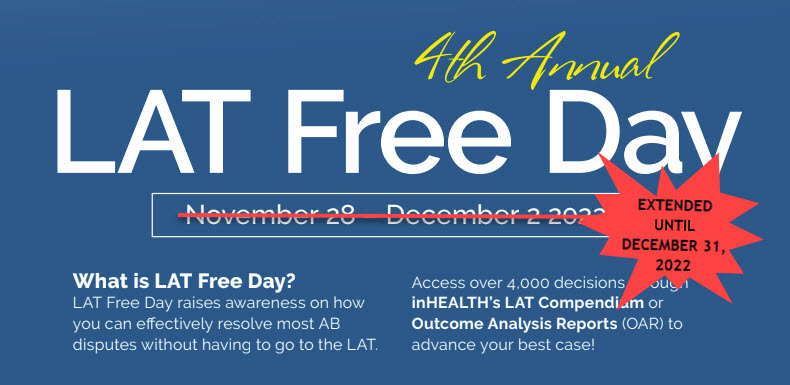
COMPLIMENTARY ISSUE – Volume. 6 Issue. 49 – December 21, 2022
This week the Tribunal considers whether an Applicant who claims not to be eligible for IRB, nevertheless, is still required to submit an OCF-10 Election of Benefits with respect to IRB and/or NEB.
In the second case, the Tribunal finds that to allow a chiropractor to testify regarding psychological impairments, would result in a usurping of the Tribunal’s role.

OARs provide 3 LAT Decisions each for and against for your fact situation, to inFORM your position, compare your evidence and assess your risk.
NEB/IRB Ambiguity Requires Election
Ambiguity Requires Election – Following an accident, the Applicant Wilmot, in 21-002048 v Aviva, submitted a Disability Certificate (OCF-3) indicating he was working on the date of loss, that confirmed both that he was substantially unable to complete the essential tasks of his employment, and suffered from a complete inability to carry on a normal life.
As a result, Aviva sent Wilmot a letter requesting an Employer’s Confirmation of Income (OCF-2) and an Election of Income Replacement, Non-Earner Benefit or Caregiver Benefit (OCF-10). This request was repeated two months later, again requesting the OCF-2 and OCF-10. Approximately one year later, Aviva sent a series of letters, confirming that they had yet to receive the OCF-10, required to help Aviva determine which benefit Wilmot was pursuing.
In response, Wilmot sent Aviva a letter, that indicated in part that he was as at that time working as a forklift operator, “so no IRB”, and further that as the OCF-1 indicated he was in school on the date of loss, the “benefit of choice would be NEB.” Once again Aviva requested an OCF-10, to date which Wilmot has not provided. Wilmot submitted that “an OCF-10 was not required as it was evident from the facts and documents filed, that the only specified benefit he was eligible for, was NEBs…his legal representative confirmed to the respondent that he was not eligible for IRBs and that he only qualified for NEBs. Given that there was no ambiguity, the applicant submits that there is no obligation to provide an election.”
The Tribunal however disagreed with Wilmot, finding there to be “sufficient ambiguity as to whether the applicant was potentially entitled to either IRBs or NEBs, such that the respondent’s request for an OCF-10 was valid.” Continuing, “where an application indicates possible entitlement to more than one specified benefit, in addition to an OCF-1 and an OCF-3, an OCF-10 is required to “complete” the application for the purposes of triggering the obligations set out in section 36(4) of the Schedule.”
To that end, Aviva had sought an Election on numerous occasions, in order to address the ambiguity regarding entitlement to IRB and/or NEB. Having failed to submit an OCF-10, Wilmot’s application was accordingly incomplete, therefore he was precluded from proceeding with his claim for NEB before the Tribunal.
Chiropractor Usurping Adjudicator’s Role?
Chiropractor Not “Expert” – One of the grounds upon which the Applicant Crecoukias sought reconsideration was that it was an error of law for the Tribunal not to have allowed his chiropractor, Dr. Persi, to testify on Crecoukias’s psychological impairments. In 19-014590 v TTC, Crecoukias relied upon R. v. Marquard in submitting that “the only requirement for the admission of expert opinion is that the expert witness possess special knowledge and experience going beyond that of the trier of fact. Deficiencies in the expertise go to weight, not admissibility.” Therefore, “as long as I was satisfied that Dr. Persi was sufficiently experienced in assessing psychological impairment, I should not be concerned with whether his skill was derived from specific studies or by practical training, although that may affect the weight to be given to the evidence.”
The Tribunal however, “relied on R. v. Mohan that held the admission of expert evidence depends on relevance, necessity in assisting the trier of fact and a properly qualified expert”, a decision that “clarified” R. v. Marquard. Therefore, all that needed to be demonstrated was that Dr. Persi “was qualified to provide opinion evidence on psychological impairments, or was more qualified in making a finding of fact for the purposes of chapter 14 of the AMA Guides than a Tribunal adjudicator.” In the course of the original hearing, “Dr. Persi admitted, that he was not qualified to provide opinion evidence on psychological impairments. Nor did the applicant demonstrate that Dr. Persi was more qualified than me in making a finding of fact for the purposes of chapter 14 of the AMA Guides.”
Crecoukias submitted that Persi “was in no way attempting to usurp the role of the adjudicator and the Tribunal as a finder of fact. However, I find there was no error in my determination that to allow him to testify on the severity of the applicant’s psychological impairments would have resulted in just that.” Neither a physician nor psychologist, Persi therefore was “not qualified to provide an opinion on the severity of the applicant’s psychological impairments”. Lacking both special knowledge or expertise in determining the severity of psychological impairments, “the only other purpose for his testimony or report about the severity of the applicant’s opinions is to usurp my position as the finder of fact.”
If you Have Read This Far…
Inform your position & present persuasive arguments. Include an Outcome Analysis Report (OAR) in your case evaluation complete with For/Against cases. Get an OAR – Available as a fee for service.
inHEALTH Keeps you LAT inFORMED With Access To:
1. LAT Compendium Database – a relational database of LAT and Divisional Court Decisions equipped with multiple search options, Smart Filters, and concise case summaries
2. Notifications: – weekly LAT inFORMER delivered to your inbox Wednesdays; Newly Added Decisions on Fridays and Breaking News as and when it happens
3. Research Support: – inHEALTH’s Live Chat Experts for guided searches and technical inquiries.
Sign up for a 14 day free trial below to experience the service and see how it can help guide your decision making.
